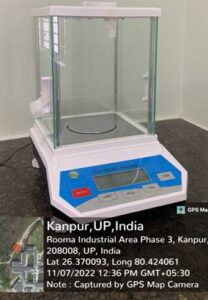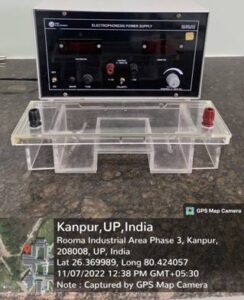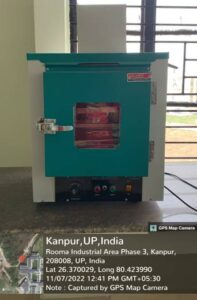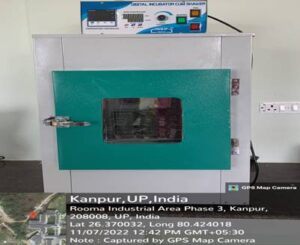| COURSE | INTAKE |
| B. TECH.(BIOTECHNOLOGY) | 30 |
DEPARTMENT OF BIOTECHNOLOGY (B.TECH BIOTECH)
The Department of Biotechnology was established in 2020. We provide excellence in academics/research and believes in the holistic development of the students .We encourage students to achieve success by providing quality education and research facilities, supported with dynamic and focused curriculums, well-trained biotechnologists are developed to suit academia/industry/research perspectives. The faculty is efficiently involved with students to enhance their practical knowledge and scientific aptitude. The Department has very highly qualified teaching faculty with Doctorate degree from premier institutions in the different areas of Biotechnology. The Department has a wide range of laboratories namely, Biochemistry Lab, Microbiology Lab, Fermentation Biotechnology Lab, Down Stream Processing Lab, Immunology Lab, Enzyme Engineering Lab, Bioprocess Engineering Lab, Genetics and Molecular Biology Lab, Plant Biotechnology Lab, Bioinformatics Lab, equipped with instrument facilities like PCR, Gel Documentation System, Spectrophotometer, BOD incubator, deep freezer etc. The undergraduate programme B. Tech Biotechnology offered by Department of Biotechnology is approved by AICTE, New Delhi and affiliated to Dr. A. P.J. Abdul Kalam Technical University, Lucknow.
Vision
To impart the best knowledge in the field of Biotechnology and equip the students with advanced experimental skills to shape them to become distinguished academicians/ scientists/ researchers/ entrepreneurs to serve the society, country and humanity at large.
Mission
- To develop a strong Biotechnology Engineering program based on quality education, research and training.
- To impart quality education to the students and enhance their skills which will make them globally competitive.
- To develop trained biotechnology professionals who can contribute to the continuous improvement of biotechnological services and products.
- To develop scientific and/or technical resources as per biotechnology industry demands.
- To nurture confident individuals who are effective contributors towards growth of the nation.
Program Outcomes (PO)
- PO-1: Engineering knowledge:Apply the knowledge of mathematics, science, engineering fundamentals, and an engineering specialization to the solution of complex engineering problems.
- PO-2: Problem analysis:Identify, formulate, review research literature, and analyze complex engineering problems reaching substantiated conclusions using first principles of mathematics, natural sciences, and engineering sciences.
- PO-3: Design/development of solutions:Design solutions for complex engineering problems and design system components or processes that meet the specified needs with appropriate consideration for the public health and safety, and the cultural, societal, and environmental considerations
- PO-4: Conduct investigations of complex problems:Use research-based knowledge and research methods including design of experiments, analysis and interpretation of data, and synthesis of the information to provide valid conclusions.
- PO-5: Modern tool usage:Create, select, and apply appropriate techniques, resources, and modern engineering and IT tools including prediction and modeling to complex engineering activities with an understanding of the limitations.
- PO-6: The engineer and society:Apply reasoning informed by the contextual knowledge to assess societal, health, safety, legal and cultural issues and the consequent responsibilities relevant to the professional engineering practice.
- PO-7: Environment and sustainability:Understand the impact of the professional engineering solutions in societal and environmental contexts, and demonstrate the knowledge of, and need for sustainable development.
- PO-8: Ethics:Apply ethical principles and commit to professional ethics and responsibilities and norms of the engineering practice.
- PO-9: Individual and team work:Function effectively as an individual, and as a member or leader in diverse teams, and in multidisciplinary settings.
- PO-10: Communication:Communicate effectively on complex engineering activities with the engineering community and with society at large, such as, being able to comprehend and write effective reports and design documentation, make effective presentations, and give and receive clear instructions.
- PO-11: Project management and finance:Demonstrate knowledge and understanding of the engineering and management principles and apply these to one’s own work, as a member and leader in a team, to manage projects and in multidisciplinary environments.
- PO-12: Life-long learning:Recognize the need for, and have the preparation and ability to engage in independent and life-long learning in the broadest context of technological change.
Program specific outcomes (PSO’s)
PSO1: Engineering Graduates shall have the ability to apply fundamental knowledge of biological science, engineering principles and scientific methods to solve the biotechnology- related problems
PSO2: Engineering Graduates shall have the research-based knowledge like; Experimental design, analysis and interpretation of biological data related to bioprocess engineering, genetics engineering, molecular biology and bioinformatics etc, for the developments in biotechnology.
PSO3: Engineering Graduates shall have the ability to work individually or in groups with strong moral values to promote the importance of entrepreneurship, communication and management skills for the next generation biotechnologists.
PSO4: Engineering Graduates shall have the ability to integrate biological knowledge and concepts with the ethical and industrial perspectives of biotechnology.
Course Outcome (CO)
Institute is affiliated to Dr. A. P. J. Abdul Kalam Technical University Lucknow therefore course outcome (CO) of each course is defined by the BOS of the university.
Click to view the syllabus with CO –
B.TechBiotech II year
B.Tech Biotech III year
B.Tech Biotech IV year
Click to view – List of faculties
MessageBiotechnology is a specialized discipline that has emerged in recent times and promises to solve problems related to human health, agriculture, and industry. Biotechnology is recognized as the “Technology of Hope”. Engineering applications of Biotechnology cater to industries such as agriculture, food, and beverages, pharmaceuticals, environment, energy and health sector, etc. The Department of Biotechnology at Kanpur Institute of Technology, Kanpur, is offering B.Tech in Biotechnology programme. The curriculum is according to the present day needs of the industrial sectors. The department has ICT-enabled classrooms, and all the laboratories in the department have adequate facilities such as equipments, analytical instruments, glassware, and chemicals to conduct experiments as per the curriculum. The department has well qualified, experienced and committed faculty. We are committed to impart quality education by laying emphasis on an integrated approach towards education, research and on academia-industrial collaboration. The department is committed to create an academic environment that would match the best Biotechnology Institutes in the country. The curriculum aims to provide a platform for biotechnology students and enables them to prepare for lifelong learning, by nurturing independent thinking, initiating scientific enquiry and developing their entrepreneurship skills thereby enhancing their employability. | Dr.Neeraj Mishra Head,Biotechnology |
Infrastructure:
Department of Biotechnology has adequate numbers of spacious, well-furnished classrooms supplemented with all necessary teaching aids. We have seminar hall which is equipped with state of art audio video aid .The seminar hall is utilized for seminar and project, dissertation and training reports presentation of students. Along with this it is also utilized during organization of workshop and guest lectures. Department of Biotechnology is having well equipped laboratories.
Department of Biotechnology has the fully equipped laboratories for the Under Graduate programs.
- Biochemistry Lab
- Microbiology Lab
- Fermentation Biotechnology Lab
- Down Stream Processing Lab
- Immunology Lab
- Enzyme Engineering L:ab
- Bioprocess Engineering Lab
- Genetics and Molecular Biology Lab
- Plant Biotechnology Lab
- Bioinformatics Lab
The laboratories are well organized and spacious with proper ventilation, electricity and water supply and are also well equipped with essential basic/advance equipments:
Spectrophotometer
Spectrophotometer is an instrument works on the principle of Beers-Lamberts law and is used extensively in academia and industry for estimation purpose. Spectrophotometer is more precise and work in wide range of spectrum.

Light Microscopes
Light microscopes are used for magnifying and resolving biological and non-biological efficient. The microscopes available in department are powered by LED providing better illumination.

High Precision Weighing Balance
These are highly sensitive balance and are used for weighing to third decimal place in gram. They possess glass protection to avoid errors due to air currents.

Laminar Air Flow
Laminar air flow cabinet provides sterile and aseptic environment free of contamination for performing various laboratory exercises and research practices particularly microbiology and cell and tissue culture based practicals.

Autoclave
An autoclave is used to sterilize surgical equipment, laboratory instruments, pharmaceutical items, and other materials. It can sterilize solids, liquids, and instruments of various shapes and sizes.

Centrifuge
This instrument commonly used in molecular biology, biochemistry, and cell biology for the separation of small particles such as viral particles, proteins or protein complexes, lipoproteins, nucleic acids.

UV transilluminator
UV transilluminator is widely used instrument to observe DNA and proteins. It emits high energy UV radiation and should be handled with care by the users.

Distillation Unit
Distillation unit is used to get impurity free water which is characterized by neutral pH and poor conductivity. Pure water is requisite of sensitive analysis.

Polymerase Chain Reaction (PCR)
Polymerase chain reaction (PCR) is a technique used to exponentially amplify a specific target DNA segment and is widely utilized in modern research pertaining to molecular biology, genomics and other field of basic and applied sciences.

pH Meter
The pH meter is micro controller-based instrument, the design utilizes latest high specification components and provides trouble free result/ service. The instrument is routinely utilized for maintaining pH of solutions, solvents and media in various laboratory practices.

Electrophoresis Unit
It is used for the separation of biomolecules such proteins and nucleic acid loaded in the gel system under the electric filed. It applies an electric charge to molecules, causing them to migrate towards their oppositely charged electrode.

Incubator
This instrument is providing the suitable temperature required for the growth of cultures .The incubator besides providing optimum temperature is also provided with shaker provide mechanical agitation.

Incubator Shaker
This instrument is providing the suitable temperature required for the growth of cultures .The incubator besides providing optimum temperature is also provided with shaker provide mechanical agitation.

Colorimeter
It is used to test the concentration of a solution by measuring the transmittance and absorbance of light passing through a liquid sample.

BOD Incubator
BOD incubator is used extensively for biological studies. The instrument is used in maintaining and storing microbial cultures.

Lab Oven
Lab oven are primarily used for drying glassware, sterilize biohazard waste, dissecting instruments or media/reagents for aseptic assays.

